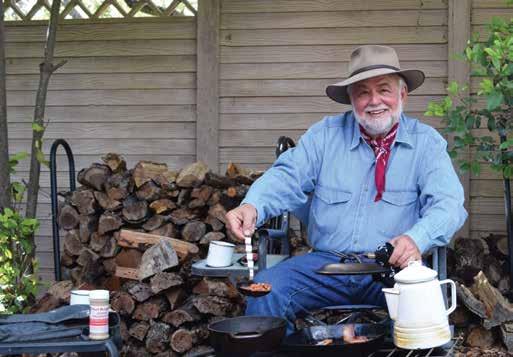
5 minute read
Texas Women in the Outdoors
Sarah Wennersten: North Texas Lady Game Warden
By Judy Jurek
Game Warden Sarah Wennersten, an energetic, physically fit gal, is the Texas Parks and Wildlife Department’s law enforcement covering three North Texas Panhandle counties: Castro, Deaf Smith, and Parmer. Flat, open farm and ranch land, this sparsely populated area with less than 36,000 human inhabitants covers 3,300 square miles, the total combined numbers of all three counties in the western Panhandle.
Yet, the three-county area is a wildlife mecca. Whitetail and mule deer, pronghorn antelope, sandhill cranes, geese, ducks, doves, quail, and pheasants call this area home, permanently and seasonally. All this and more keeps Sarah very busy.
“A Texas game warden is like a Swiss army knife of law enforcement,” she said. “Yes, we focus on and specialize in conservation law enforcement and regulations, but we also participate with traffic, criminal law, rescue operations, and educating the public. It’s something different every day.”
Sarah was born and raised near Seattle, Washington, but her mother came from the Plainview area. She grew up visiting extended family Texans. Attending Plainview’s Wayland Baptist University, she earned a bachelor’s degree in exercise and sports science and master’s degree in sports administration.
She ran a personal training business for eight years and became a university adjunct professor of nutrition and fitness training. Sarah always desired being in law enforcement like her policeman father. After completing training, she worked one year as a police officer near Lubbock.
Growing up hunting deer, elk, and bears, Sarah had once considered becoming a Washington State game warden. Texas looked much different than the Pacific Northwest, but after applying and getting accepted, Sarah graduated from the 63rd Texas Game Warden class in 2020.

Removing wildlife from where they don’t belong is an everyday experience in Game Warden Sarah Wennersten’s life. She relocated this barn owl elsewhere.

Removing an illegal gill net at Falcon Lake, Wennersten encountered this armored catfish. Due to people dumping aquarium fish, this suckermouth algae eater is now an invasive species in Texas’ waters.
Sarah requested to work in Starr County along the U.S.-Mexico border as her first assignment because she wanted to “learn as much as quickly as possible” about being a game warden. One year later, a job opening near Plainview became available. The area’s also home to the famed XIT Ranch and other huge ranches encompassing thousands of acres.
“I pretty much went from almost as far south to as far north in Texas as possible,” Sarah said. “Not only a change of terrain but a change of climate, agriculture, people, and of course, wildlife. I believe it’s made me much more rounded as a warden to work both areas.”
Sarah says Deaf Smith County has more cattle while Castro County has more farming. Like elsewhere across Texas, things vary with rain and snowfall. There are no big public lakes but numerous city and private water sources—lots of shallow water for waterfowl.
Sarah’s work area is also pheasant, quail, and dove country. Interestingly, there are no feral hogs—yet. And no wild turkeys. “It’s so flat and open, there’s no place for them,” Sarah said.
“There’s not one species or season I prefer over others,” she added. “Many seasons overlap. Pronghorn antelope and archery deer open early October with sandhill crane and quail opening late October. Goose, duck, general mule deer and whitetail seasons start in November. Pheasant (season) opens December.”
With the varied hunting and fishing seasons across the Lone Star state’s expanse, as well as all other related law enforcement duties, game wardens are often sent to assist other areas. “Summer is typically water safety. I enjoy going to Possum Kingdom Lake to help check boaters and fishermen,” she said.
“It’s a great way to constantly be learning. I’ve patrolled for mule deer hunters by plane, worked on the big boat offshore, and patrolled using ATVs along the border. And always, lots of walking! Game wardens are greatly diversified.”
Sarah studied hard to become a FAA licensed unmanned aerial systems drone pilot. Drone use has proven instrumental in protecting state resources, with search and rescue missions, crime scenes, and accident investigations. In addition to TPWD, she assists other law enforcement agencies.
A bird’s-eye view often assesses dangers invisible from ground level. Sarah recently used a drone to check for weapons before officers approached a suicidal subject barricaded in a vehicle. Searching large areas for crime suspects and missing persons saves manpower resources as well.
In her spare time, Sarah enjoys hunting, woodworking, camping, and hiking. Her dogs, Adeara Jane and Adley Mae, help turn off her “work brain.” Sarah also helps rescue and foster other canines. Involved heavily in fitness and martial arts, she’s finishing her black belt in Shotokan karate, but currently focuses on Brazilian jiu-jitsu.
Sarah laughed, “Jiu-jitsu is easier on the body.” The strict motto she lives by: “Today I will be a better version of myself than I was yesterday.”
Her advice to anyone considering a game warden career:
“Maintain your fitness. Volunteer in anything for experience dealing with people,” she said. “Get comfortable engaging strangers in conversation. Physical skills will come, but building mental toughness and fortitude gives the foundation needed for success as a game warden. Do your best at every job tackled, and be disciplined in all your life’s aspects.”
Sarah said the best part of her job is freedom. “I love my job! It’s not 8 to 5; we’re on call 24/7. You change your schedule as necessary,” she said. “It’s not always writing tickets but educating the public, making sure they understand the bigger picture of conserving our state natural resources for generations to come. You stay busy.”

















